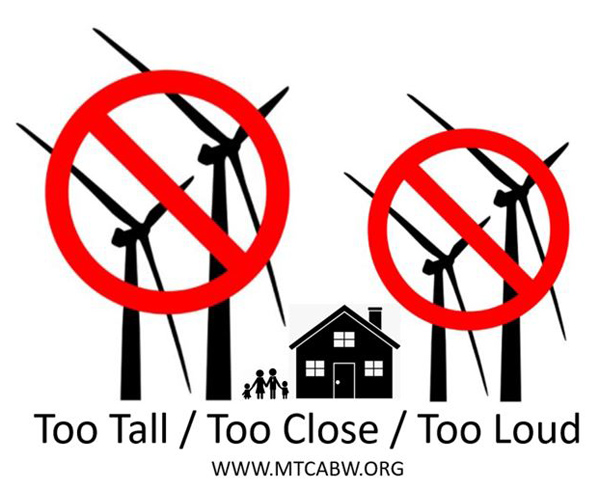
Montcalm County in rural north-central Michigan, a hotbed of anti-renewable energy activity since 2021, saw voters in four townships reject referendums that would have established guidelines for wind or solar projects.
Voters in three of the townships — Douglass, Maple Valley and Winfield — also recalled seven officials considered supporters of wind power. Three were the townships’ top officials: Supervisor Terry Anderson in Douglass Township, Supervisor John Schwandt in Maple Valley and Supervisor Phyllis Larson in Winfield.
Voters also rejected a proposal to regulate residential and commercial solar energy projects in Belvidere Township. Belvidere Township does have a wind regulation ordinance on the books that was approved earlier this year by the council.
With all four proposals defeated, wind or solar energy projects in those townships cannot go forward. Local governments’ zoning commissions must reconsider how to handle any potential projects that may come before them.
 A group called Montcalm County Citizens United has led the fight against wind power in the rural county. | Montcalm County Citizens United
A group called Montcalm County Citizens United has led the fight against wind power in the rural county. | Montcalm County Citizens UnitedDisputes over renewable energy projects — to date, mostly wind farm projects — are not uncommon in Michigan. But in the past two years Montcalm County has been a center of local opposition, led by a group called Montcalm County Citizens United, which distributed lawn signs saying: “2 Tall, 2 Close, 2 Loud. Not In My Backyard.”
Apex Clean Energy has been working for four years to develop a wind farm in the county with up to 75 turbines (375 MW). The company has also added a solar energy component to the project.
Brian O’Shea, Apex’s director of public engagement, said the company was disappointed with some of the election results, charging voters had been misled by an “organized misinformation campaign.” But he said the company still planned to work with “with over 500 participating farmers and landowners to develop a responsible wind project in Montcalm County and help accelerate Michigan’s shift to clean energy.”
Michigan has at least 3,231 MW of wind power, 6.8% of its total generation, with 225 MW under construction, according to the Department of Energy.
Opponents of the Montcalm regulatory proposals overwhelmed supporters in all four townships. In Belvidere Township, with the solar proposal, the race was the closest with 600 against and 378 in favor. Douglass Township had votes on two proposals regulating wind farms, and both failed. The first proposal was defeated 812 to 297, while the second proposal went down 819 to 304.
The Maple Valley Township proposal failed 594 to 265. And the Winfield Township proposal failed 736 to 355.
Winfield Supervisor Larson lost her recall election by just 56 votes. She said she was targeted because she had cast the deciding vote on the township’s wind ordinance.
Local media reported that the election results are leading some to call for the state — which has a goal of generating 60% of its power from renewables by 2030 — to take control of siting of energy projects.
“What happened in Montcalm is part of a larger chorus of [grassroots opposition] to these projects,” Ed Rivet, executive director of the Michigan Conservative Energy Forum, a nonprofit that advocates for clean energy, told Bridge Michigan. “I don’t see the trend (of local opposition) suddenly disappearing,” Rivet said. “The more that goes on, the more it will lead to a policy discussion.”
Charlotte Jameson, chief policy officer for the Michigan Environmental Council, told MLive there is a growing consensus that the state must become more involved: “The siting issue is definitely one where you have environmental groups, utilities and labor in agreement that there needs to be some kind of solution here.”


